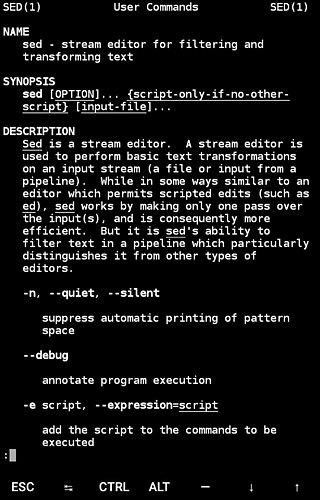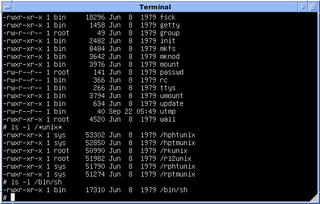SunOS is a Unix-branded operating system developed by Sun Microsystems for their workstation and server computer systems. The SunOS name is usually only used to refer to versions 1.0 to 4.1.4, which were based on BSD, while versions 5.0 and later are based on UNIX System V Release 4 and are marketed under the brand name Solaris.
troff, short for "typesetter roff", is the major component of a document processing system developed by Bell Labs for the Unix operating system. troff and the related nroff were both developed from the original roff.
In computing, a core dump, memory dump, crash dump, storage dump, system dump, or ABEND dump consists of the recorded state of the working memory of a computer program at a specific time, generally when the program has crashed or otherwise terminated abnormally. In practice, other key pieces of program state are usually dumped at the same time, including the processor registers, which may include the program counter and stack pointer, memory management information, and other processor and operating system flags and information. A snapshot dump is a memory dump requested by the computer operator or by the running program, after which the program is able to continue. Core dumps are often used to assist in diagnosing and debugging errors in computer programs.

A man page is a form of software documentation usually found on a Unix or Unix-like operating system. Topics covered include computer programs, formal standards and conventions, and even abstract concepts. A user may invoke a man page by issuing the man command.

The Bourne shell (sh) is a shell command-line interpreter for computer operating systems.
Lex is a computer program that generates lexical analyzers. It is commonly used with the yacc parser generator and is the standard lexical analyzer generator on many Unix and Unix-like systems. An equivalent tool is specified as part of the POSIX standard.

In Unix-like and some other operating systems, the pwd command writes the full pathname of the current working directory to the standard output.
The Filesystem Hierarchy Standard (FHS) is a reference describing the conventions used for the layout of Unix-like systems. It has been made popular by its use in Linux distributions, but it is used by other Unix-like systems as well. It is maintained by the Linux Foundation. The latest version is 3.0, released on 3 June 2015.

Version 7 Unix, also called Seventh Edition Unix, Version 7 or just V7, was an important early release of the Unix operating system. V7, released in 1979, was the last Bell Laboratories release to see widespread distribution before the commercialization of Unix by AT&T Corporation in the early 1980s. V7 was originally developed for Digital Equipment Corporation's PDP-11 minicomputers and was later ported to other platforms.
The Unix command su, which stands for 'substitute user', is used by a computer user to execute commands with the privileges of another user account. When executed it invokes a shell without changing the current working directory or the user environment.
m4 is a general-purpose macro processor included in most Unix-like operating systems, and is a component of the POSIX standard.
In computing, echo is a command that outputs the strings that are passed to it as arguments. It is a command available in various operating system shells and typically used in shell scripts and batch files to output status text to the screen or a computer file, or as a source part of a pipeline.

In computing, cp is a command in various Unix and Unix-like operating systems for copying files and directories. The command has three principal modes of operation, expressed by the types of arguments presented to the program for copying a file to another file, one or more files to a directory, or for copying entire directories to another directory.
ALGOL 68C is an imperative computer programming language, a dialect of ALGOL 68, that was developed by Stephen R. Bourne and Michael Guy to program the Cambridge Algebra System (CAMAL). The initial compiler was written in the Princeton Syntax Compiler that was implemented by J. H. Mathewman at Cambridge.

The history of Unix dates back to the mid-1960s, when the Massachusetts Institute of Technology, AT&T Bell Labs, and General Electric were jointly developing an experimental time-sharing operating system called Multics for the GE-645 mainframe. Multics introduced many innovations, but also had many problems. Bell Labs, frustrated by the size and complexity of Multics but not its aims, slowly pulled out of the project. Their last researchers to leave Multics – among them Ken Thompson, Dennis Ritchie, Doug McIlroy, and Joe Ossanna – decided to redo the work, but on a much smaller scale.
The term "Research Unix" refers to early versions of the Unix operating system for DEC PDP-7, PDP-11, VAX and Interdata 7/32 and 8/32 computers, developed in the Bell Labs Computing Sciences Research Center (CSRC).

Unix is a family of multitasking, multi-user computer operating systems that derive from the original AT&T Unix, whose development started in 1969 at the Bell Labs research center by Ken Thompson, Dennis Ritchie, and others.
ptrace is a system call found in Unix and several Unix-like operating systems. By using ptrace one process can control another, enabling the controller to inspect and manipulate the internal state of its target. ptrace is used by debuggers and other code-analysis tools, mostly as aids to software development.
The modular debugger (mdb) is an extensible, low-level debugger developed by Sun Microsystems for the Solaris 7 operating system. It is now open sourced, under the Common Development and Distribution License (CDDL).
bs is a programming language and a compiler/interpreter for modest-sized programs on UNIX systems. The bs command can be invoked either for interactive programming or with a file containing a program, optionally taking arguments, via a Unix shell, e.g., using a Shebang (Unix) #!/usr/bin/bs.






